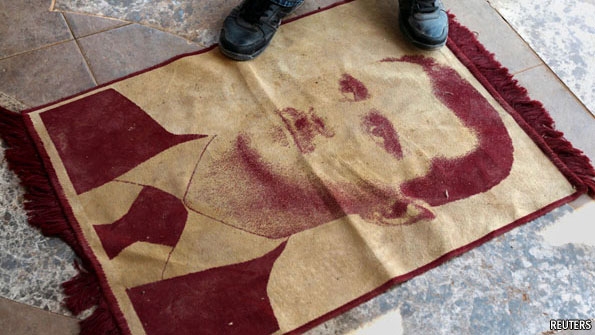
From Economist: NATO needs to start making the humanitarian and strategic case for intervening in Syria. Grounding President Bashar Assad’s air force could save many thousands of lives. Giving the rebels scope to organise and train could help bring the war to an end. Speeding the fall of Mr Assad might give Syria a chance to re-emerge as a nation at peace with itself and its neighbours. . . .
Syria is facing a long, violent, sectarian civil war that will claim tens of thousands of lives, leave chemical and biological weapons unsecured and destabilise a region of paramount strategic importance. That is something the outside world has both a duty and an interest to prevent. But even if intervening now is the least bloody option, it will still be bloody.
In strictly military terms, the mission is feasible. NATO could enforce a no-fly zone over Syria. It is possible that the mere threat of destroying any airborne Syrian aircraft would keep Mr Assad’s planes on the ground; but America’s military planners might insist on destroying Mr Assad’s air defences anyway (harder than last year’s campaign against Libya, but still possible). The bigger worry, however, is what would follow the establishment of a no-fly zone.
Even if the aim is to protect Syrian civilians, intervention is a slippery slope. It would probably rapidly become a policy to overthrow Mr Assad. Nobody can say how long he would fight on. He would struggle without air power—especially if he lost the full use of his tanks and heavy artillery. Perhaps, sensing the hopelessness of their cause, his own officers might mount a coup. If not, the rebels would probably take many months to force him out. That would test the West’s resolve, but it would be better than a war of attrition lasting years.
And nobody can be sure who would replace him. The rebels have promised to unite, but their squabbling has been exasperating. The men with guns, who are most likely to take power, represent lots of militias, some of which can muster only a few dozen fighters. That argues against giving the rebels advanced weapons—because missiles that can destroy airliners could end up in extreme Islamist hands. But a no-fly zone would give the rebels space to organise and train. The briefer the conflict, the greater the chance that the militias who toppled Mr Assad would be commanded by moderates who are sympathetic to the West and want to put Syria back together. . . .
We do not call lightly for the world to undertake such a risky operation. But the stability of the Middle East and countless Syrian lives should not be hostage to Russian obstinacy. As the conflict drags on, month after bloody month, calls to act will mount—as in Kosovo 15 years ago. The sooner the world intervenes, the more lives can be saved, and the greater the chance that Syria can be made whole again. (photo: Reuters)
Image: reuters%2010%2019%2012%20Bashar%20Assad.jpg
